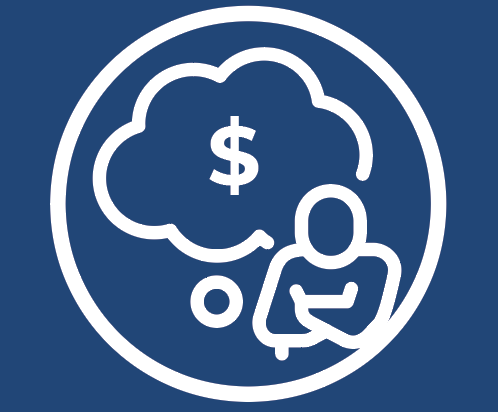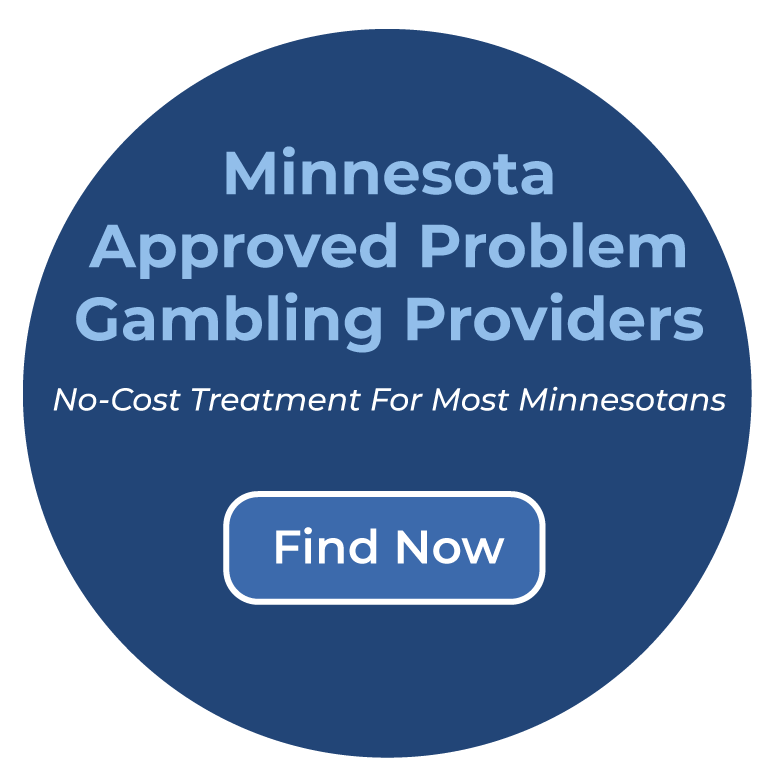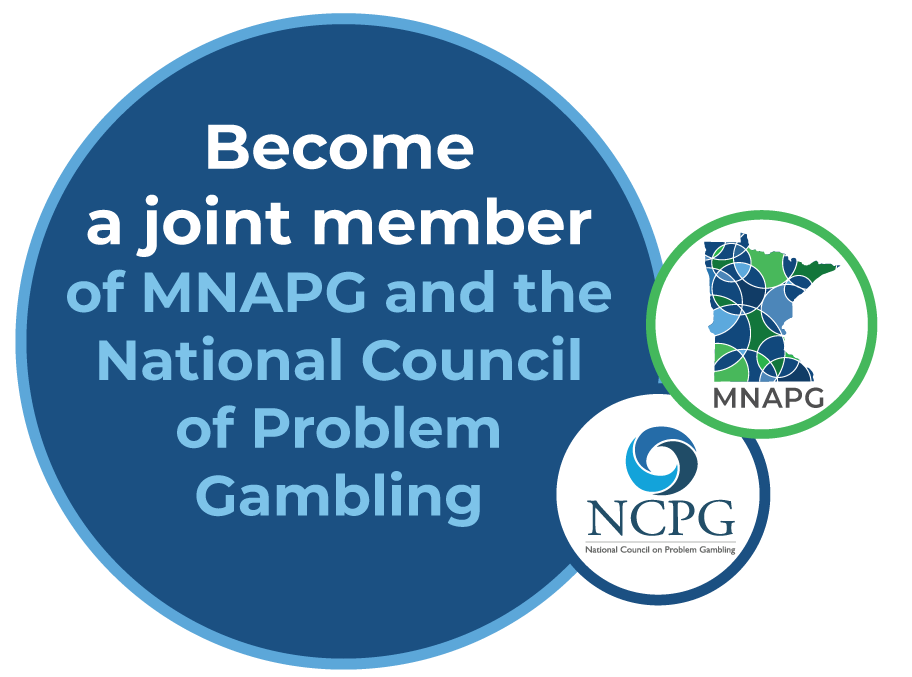NON-CLINICAL professionals
WHAT DO I NEED TO KNOW ABOUT PROBLEM GAMBLING?
Various professionals may come into contact with individuals with problem gambling and/or their concerned others. As a result, they may be in a position to suggest appropriate treatment — provided they have an awareness about gambling addiction. These professionals range from attorneys and bankers to healthcare professionals and spiritual advisors, as detailed below.
Learning about problem gambling is particularly valuable to:

Attorneys, bankers and other financial advisors may have clients with a gambling disorder or who have reached a point where addiction has forced them into severe financial problems. For these professionals, MNAPG has specific resources available to assist clients with financial planning.

General healthcare professionals may screen patients for tobacco, alcohol or drug addiction, or for anxiety or depression, but gambling addiction often isn’t on their radar. It’s important to know that gambling addiction is a highly common co-morbidity with these issues.

Human Resources/Employee Assistance Program managers can identify employees who may be experiencing gambling problems and provide resources to help them.

Spiritual and trusted community leaders may be sought out first by those with a gambling addiction as someone they can trust to talk about their problem. MNAGP offers periodic training for spiritual/trusted community leader so they can learn about this addiction and be in a position to help others. Please contact Susan Sheridan Tucker for more information.

Corrections officers may have offenders who have either committed a crime related to their gambling addiction or require treatment for a gambling disorder while incarcerated. MNAPG has developed an online training module to guide corrections officers on fulfilling assessments.
SELF-HELP PUBLICATIONS
View, download or order a hard copy below (These are meant to be supplemental guides, not a replacement for therapy)
- Your First Step to Change, 2nd Edition. A self-help toolkit of resources to help start the journey toward recovery from problem gambling behavior.
- Personal Financial Strategies for the Loved Ones of Problem Gamblers
BROCHURES
- Warning Signs of Problem Gambling (English, Spanish, Chinese, Hmong and Vietnamese)
- What Families Can Do When a Loved One has a Gambling Problem (English and Spanish)
- What is Problem Gambling? (English, Somali and Spanish)
- Gambling When in Recovery (English and Spanish)
- Gaming Disorder (English and Spanish)
- Gamban—Block Access to Your Devices (English and Spanish)
- Lower Risk Gambling Guidelines
- Older Adults and Gambling
- Talking to Your Child About Gaming
- Youth and Gambling—What Parents Need to Know
BROCHURES for professionals
- Be Part of the Solution (English and Spanish)
- Why Screen for Gambling Disorder? (English and Spanish)
Newsletter
- Northern Lights - MNAPG Quarterly Newsletter
Interested in receiving copies of our literature?
MINNESOTA APPROVED PROVIDERS
Carver County
Resilience Counseling
(612) 750-3376
dahnertmary@icloud.com
1107 Hazeltine Blvd, Suite 410, Chaska, MN 55318
Goodhue County
Midwest Recovery
(651) 846-9010
Info@midwestrecovery.org
midwestrecovery.org
217 Plum Street, Suite #130 Red Wing MN 55066
Hennepin County
Club Recovery Inc
(952) 926-2526
cjohnson@clubrecoveryllc.com
clubrecoveryllc.com
7701 York Ave S, Suite 350, Edina, MN 55435
Connections Counseling & Recovery Services
(763) 370-8880
Joyce Terhorst
joyce.connections@yahoo.com
7550 France Ave S, Suite 220, Edina, MN 55435
Midwest Recovery Inc
(612) 584-4858
info@midwestmn.com
midwestrecovery.org
1620 Central Ave NE, Suite 107, Minneapolis, MN 55413
Problem Gambling Intervention, LLC
(612) 558-5364
Roger Anton
rpanton@juno.com
Minneapolis VA Medical Center, 1 Veterans Drive, Minneapolis, MN 55417
Vinland National Center OP Services
(763) 479-4882
Don Raasch
donr@vinlandcenter.org
vinlandcenter.org
675 NE Stinson Blvd #200, Minneapolis, MN 55413
Itasca County
Lakeview Behavioral Health
218-327-2001
info@lakeviewbh.com
www.lakeviewbh.com
516 S. Pokegama Ave, Grand Rapids, MN 55744
Mille Lacs County
Freedom Center
(763) 308-0006
Cynthia Naumann
maumann.cindi@gmail.com
freedomcenterinc.org
140 2nd Ave NE, Milaca, MN 56353
Olmsted County
Christina Pristash
(507) 202-0701
Christina Pristash
pristashlmft@gmail.com
counselingrochester.org
1500 1st ave NE, Suite 120, Rochester, MN 55906
Ramsey County
Alcohol and Gambling Assessments
(651) 485-6229
Renee Collova-Bergee
reneebergee@comcast.net
1397 Geneva Ave N #102A, Oakdale, MN 55128
Pathways Counseling
(651) 734-5517
Jarrod Brown
jerrodb@pathwayscounselingcenter.org
1919 University Ave W, Suite 6, St Paul, MN 55104
Progressive Individual Resources, Inc.
(612)749-3309
info@pirimn.org
pirimn.org
2147 University Ave W, Suite 206, St Paul, MN 55114
Rice County
Midwest Recovery
651-846-9010
info@midwestrecovery.org
midwestrecovery.org
303 1st Street NE, Suite #365 Faribault, MN 55021
Saint Louis County
Center for Alcohol & Drug Treatment Gambling Services
(218) 723-8444
Paul McCormick
pmccormick@cadt.org
cadt.org
314 West Superior Street Suite 400, Duluth, MN 55802
Sherburne County
Freedom Center
(763) 308-0006
Cynthia Naumann
naumann.cindi@gmail.com
freedomcenterinc.org
105 6th Ave S, Princeton, MN 55371
Washington County
Bridges and Pathways Counseling
(612) 719-7966
Paul Mladnick
mladnick.paul50@gmail.com
1068 S Lake St, Suite 109, Forest Lake, MN 55025
Venthouse Counseling, Jason Walter
(612) 562-6766
Jason Walter LPC, LADC
aadrjay@gmail.com
venthousecounseling.com
8530 Eagle Point Blvd, #100, Lake Elmo, MN 55042
Alcohol and Gambling Assessments
(651) 485-6229
Renee Collova-Bergee
reneebergee@comcast.net
1397 Geneva Ave N #102A, Oakdale, MN 55128
Yellow Medicine County
Project Turnabout/ Vanguard Center for Compulsive Gambling
(320) 564-4911 or 1-800-862-1453
info@projectturnabout.org
projectturnabout.org
660 18th St, Granite Falls, MN 56241
Cass
Soul Solutions
(701) 356-7772
info@soulsolutions.org
soulsolutions.org
1801 38th St S, Fargo, ND 58103
SIGNS OF PROBLEM GAMBLING
Given the subtle nature of gambling problems, how can you identify someone who is at risk for gambling disorder? Here are nine warning signs:

Loss of control
Repeated unsuccessful attempts to control, reduce or stop gambling

Escape
Gambling to escape from problems or feelings (i.e., depression, loneliness, etc.)

Chasing
Try to win back gambling losses with more gambling

TOLERANCE
Need for larger or more frequent wagers to experience the same “rush”

LYING
Lying about the frequency of gambling or amounts won or lost

Preoccupation
Frequent thoughts about gambling experiences (past, future or fantasy)

BAILOUT
Relying on others to relieve a desperate financial situation caused by gambling

Withdrawal
Restless or irritable when attempting to cut down or stop gambling

Risked significant relationship
Gambling despite risking or losing a relationship, job or other significant opportunity
Gambling disorder can inflict considerable financial harm. Individuals who struggle with a gambling addiction are likely experiencing a range of financial problems, including debt (credit cards, casinos, family and friends), past due state and federal taxes, and even debt to illegal sources, such as loan sharks. The extent of their issues may not be known immediately, as gamblers are quite adept at covering their tracks.
As financial professionals review their client’s finances, they may notice patterns that suggest a gambling problem. Bankruptcy, foreclosure or embezzlement may be the result of an underlying gambling issue which needs to be addressed by the gambler and understood by family members.
If a family member or a gambler reaches out for assistance it’s critical to provide the necessary protections to prevent further financial harm. It’s also important to understand the mind of a problem gambler, which is steeped in irrational thinking.
It’s important to be aware of the signs of a gambling addiction. Gambling addiction, like substance addiction, can lead people to behave in ways that cause problems for themselves and their families. In some cases, the financial devastation created by gambling addiction results in fraud, embezzlement, theft and other criminal activities. Problem gambling also results in legal consequences involving families, jobs, property, debt and other matters.
Legal professionals should become educated about gambling addiction so they can consider whether a gambling problem might be at the root of criminal activity. With appropriate screening and assessment, such problems can be better diagnosed.
For first-time offenders with a gambling problem, referral to treatment may be appropriate. Free treatment is available for qualifying individuals in Minnesota. Referrals to state-approved gambling treatment providers can be found here or by calling 1-800-333-HOPE (4673).
Here are some scenarios that can help you identify someone with a gambling addiction.
REVIEW OF FINANCIAL INFORMATION
As you review financial information, you may note patterns that suggest a gambling problem. For example, you may see multiple withdrawals that form a suspicious narrative, or you may see that multiple credit cards are maxed out. Further investigation may determine that a gambling issue is present.
BANKRUPTCY
An attorney or the trustee could note an unexpected lack of assets and suspect that a gambling addiction played a role. The presence of a gambling problem may become very relevant in moving a case forward.
DIVORCE
When dividing up marital assets, one spouse will likely notice that the money he/she thought was there is not. There could also be joint credit card debt that one spouse is not aware of, as well as unexpected loans, wiped out college savings, an equity line of credit, etc. A lawyer might also see incomplete information or the reluctance of a spouse to be forthcoming.
CHILD NEGLECT/ABUSE AND DOMESTIC VIOLENCE
People with a gambling addiction focus all their attention on gambling and may neglect family responsibilities. An extreme example is someone leaving their child in the car at a casino while they are inside gambling. Those persons accused or charged with neglect or violence should be referred for a gambling assessment and a substance use assessment.
ALCOHOL OR OTHER DRUG ADDICTION
In some cases, a person will switch addictions. For example, they may stop drinking but instead start gambling as a substitute. One study of people with substance use disorder published in the Journal of Addictive Diseases concluded that roughly 20 percent of study participants had significant current or past gambling problems.
SUICIDE ATTEMPTS
Suicide attempts may suggest an underlying gambling problem. The National Council on Problem Gambling estimates that one in five problem gamblers attempts to kill themselves, a rate that’s about twice that of other addictions. When a financial crisis occurs, those with a gambling addiction and high gambling debts believe there is no way out and their hopelessness drives them to contemplate and attempt suicide.
OTHER SCENARIOS
A guardian or conservator for an elderly person might discover unusually frequent trips to the casino or a surprising lack of funds. A criminal defense attorney might discover the problem when representing a client on a variety of crimes. An employment lawyer might notice a gambling problem in the context of representing a person who is being terminated for poor performance or repeated absences.
It’s difficult for many individuals to compartmentalize their private lives from their professional lives, especially if they have physical or mental health issues. If one of your employees is experiencing problem gambling, it may be impossible for them to “turn it off” while at work.
An employee with a gambling problem may exhibit:
- increased stress,
- increased tardiness,
- extended lunch breaks and absences from work,
- requests for advances in pay or pay in lieu of vacation or sick time,
- requests to borrow money from co-workers,
- bragging about gambling winnings,
- moodiness and irritability,
- decreased productivity and lack of concentration and motivation
- theft, and
- signs of financial distress, such as collection calls, garnishments and lawsuits.
An employer should be aware that someone with a gambling problem often moves their gambling to the workplace to hide it from their families, so colleagues are often the first to become aware of this activity.
TIPS FOR SUPERVISORS WHO SUSPECT AN EMPLOYEE MAY HAVE A GAMBLING PROBLEM
- Express concerns in a caring and supportive manner. Do not diagnose the problem or tell the individual what to do. Be clear, non-judgmental and speak only for yourself.
- Use work-related observations.
- Be positive.
- Explain how the problem affects you.
- Be clear about your position.
- Respect personal boundaries.
- When a gambling problem is known, provide information, not advice.
- Be prepared for denial or a hostile reaction.
WHEN HAVING A GAMBLING POLICY MAKES SENSE
The negative effects of a gambling problem can cause a serious impact on the workplace. A sound gambling policy is especially important for employers that deal with significant amounts of cash, are located near gambling venues, have flexible work schedules, frequently send employees away from home or employ recovering gambling addicts. The purpose of a gambling policy is to communicate the employer’s universal expectations for all employees regarding gambling in the workplace.
OFFICE POOLS, GAMBLING AND FANTASY SPORTS POLICY
Gambling, especially office pools and fantasy sports, are becoming more popular. Many employees participate in gambling and sports betting, such as Super Bowl and March Madness pools. As employees inevitably begin to build social relationships, they will want to participate in these types of activities together. This policy will explain what the employer defines as gambling, provide guidelines for what types of activities will and will not be allowed on the employer’s premises, and assist employers in identifying and responding to employees who may have a serious gambling problem.
WHAT CAN YOUR ORGANIZATION DO?
A proactive response from your organization will help reduce the negative impact problem gambling can have within the workplace. The following are some measures to consider.
- Policy statements. Incorporate the topic of gambling into relevant policies. Most companies have policies on internet use, phone use and disallowed activities during work hours. When reviewing policy statements make sure the policies are sufficiently comprehensive to address problem gambling issues, e.g., internet gambling.
- Provide awareness training. Without awareness, problem gambling will not be detected. The signs of a gambling problem are seldom identified as gambling related. Training can help employees and employers identify and assist the problem gambler.
- Make financial counseling available. Financial issues can be just as serious as mental health disorders. It is important that financial counseling be made available to employees who are in a financial crisis.
- Monitor the money stream. Some occupations involve direct contact with money, while in other occupations money can be “moved.” These occupations might be considered high risk for the problem gambler, and a monitoring system can protect employee and employer.
Gambling and Health in the Workplace, an NCRG publication 2012. Source: XPert HR
MNAPG offers training for community leaders who have an interest in learning more about problem gambling. There is no cost for the training; we merely ask that you commit to making the time to complete it.
In total, the training consists of 16 hours of instruction. Twelve hours are online and we provide plenty of time to complete this section. The later four hours will be in person, bringing the cohort together to learn more specifically about Minnesota’s gambling landscape and to ask us and yourselves questions. By the end of the training, you will have a basic understanding of the issue and will be able to provide members of your community a variety of resources.
If you have interest in participating in our Community Leader training, please contact sstucker@mnapg.org and indicate on the subject header: Community Leader Training.
Most importantly, this training will equip spiritual leaders to serve as the best “first responders” to people seeking help for problem gambling.
Core Curriculum:
- The dynamics and psychology of addiction
- Problem gambling defined and described; gambling disorder defined and described; the scope of problem gambling in American society
- The impact of problem gambling on families; the components of effective support for the loved ones of gamblers
- Financial issues faced by gamblers and their families
- The goals of problem gambling treatment; the options for treatment
- Spirituality and its significant role within the recovery process; the spiritual issues commonly encountered by those with gambling disorder and their loved ones
- The unique role of a spiritual leader in the recovery care process
- Awareness of problem gambling support groups: GA; Gam-Anon, Celebrate Recovery and others
(Note: the spiritual leader certification process does not train one to be a therapist; rather, leaders will learn about treatment and understand what individuals in treatment may encounter as they go through the recovery process.)
Rule 82 Online Training
The state of Minnesota requires that a person convicted of certain offenses be screened to determine whether compulsive gambling contributed to the offense. The screens are performed by trained probation officers who understand the basics about gambling. The requirement that probation officers perform screenings is known as Rule 82.
MNAPG, working in conjunction with the Minnesota Department of Human Services and the Minnesota Department of Corrections, helps to make sure that appropriate Rule 82 training is provided to probation officers. This training is available online to increase both accessibility and quality of training. The more that probation officers understand about gambling addiction, the better they’ll be able to recognize the behavior.
The training for probation officers covers a range of topics, including problem gambling warning signs, the various phases of gambling addiction, how compulsive gambling compares with chemical dependency, and how compulsive gambling leads to crime.
The South Oaks Gambling Screen (SOGS) is introduced to probation officers during the training. The probation officer’s role and responsibility regarding the screening is also discussed. Rule 82 training can be accessed here.


